A window should justify
its burden
Windows are a burden on
society because they makes buildings more difficult to design,
construct, and maintain; they increase the need for heating and
cooling;
they require occasional cleaning; and they are fragile. Therefore,
every window
should provide enough of a benefit to counteract its burden.
An example
of windows that are not
beneficial are those that open into shafts,
such as those in the photo
below, right.
Although they provide a small amount of light, the view out the window
is so unpleasant that most people want to keep the curtains closed, or
use frosted glass. Those windows provide some ventilation, but they
also
let in odors and noises from the neighbors.
|
|
|
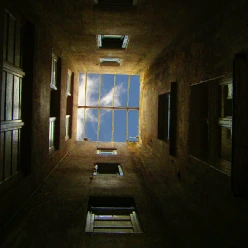 |
|

|
This type of window should be considered unacceptable for a home or
office.
|
|
Areas of a building they cannot provide proper windows should be for
something that doesn't need windows.
|
In a free enterprise system, those type of windows are provided to the peasant class, but
since everybody is equal in Kastron, the
Neighborhoods Ministry is required
to ensure that every apartment has desirable
windows, and that all apartments are equal to the others in regards to
size, quality,
and other features.
The sections of an apartment building that cannot provide appropriate
windows and other living conditions are required to be used for
something other than an apartment, such as laundry, maintenance, video
rooms, barbershops, or
storage.
Nature is more important to
us than windows
We want windows in our
homes because we were designed to live on the ground, among trees,
flowers, birds, creeks, and grass, just like other monkeys. We want
sunlight,
and we want to be surrounded
by nature.
Our craving for nature causes us to want windows in our home, but
looking out of a window will not satisfy
those cravings. Looking out of
a window is not much more satisfying than watching other people eat
food, or sitting in front of a television and watching fictional people
have fictional friendships and fictional activities.
Looking out of a window is enjoyable only for brief periods, such as when we want
to have a meal by ourselves, or when we want to relax, in which case we
can go to a restaurant or lounge and look out of a window to observe
the weather, people, trees, parks, creeks, or clouds.
Cats and dogs often sit in front of a window and look outside, but it
is unusual to see people looking out of their home windows, except
for
brief moments. Most people use their windows only for sunlight and
ventilation.
The reason is simply because looking out of a window does not satisfy
our craving for nature. The only people who might spend a lot of time
looking out of their window are the prisoners who have windows.
Some houses have tremendous
amount of glass windows, but the people living in them are not having a
better life than the rest of us. We cannot improve
our lives simply by providing our homes with more windows, or with
larger windows. Rather, the more windows we have, the more of a burden
we put on ourselves because the windows need cleaning, and they
increase the resources needed to control the temperature inside the
home.
The same concept applies to balconies.
Specifically, we want balconies because we want to be able to go
outside into nature, but balconies cannot satisfy that craving, so most
balconies are unused and wasted.
A more sensible way of satisfying our craving for nature is to design
our cities so that we have easy
access to nature. This is why
this Constitution advocates putting the transportation system and
utilities underground, and designing the city to be a gigantic city
park with clusters of tall buildings scattered within it.
Likewise, our craving for nature causes us to want plants, aquariums,
water fountains, and pictures of nature on the walls, but
none of those things will satisfy our cravings, either ( this was
dicussed here).
Instead of providing ourselves with giant homes with lots of windows,
balconies, plants, aquariums, and water fountains, this constitution
advocates small homes in tall apartment buildings, and surrounding the
buildings with a wide variety of parks, gardens, swimming areas, and
beautiful public buildings for social and recreational activities.
We should reduce the amount of windows in the apartments
to only those that are truly beneficial. Children and students have the
least interest in looking out of windows, so we should consider
providing them with rooms that don't have windows.
By reducing the number of windows in the apartments, we can create
apartment buildings with a higher density of people, which
reduces the amount of land needed for apartment buildings. This allows
us to have more land for recreational and social activities.
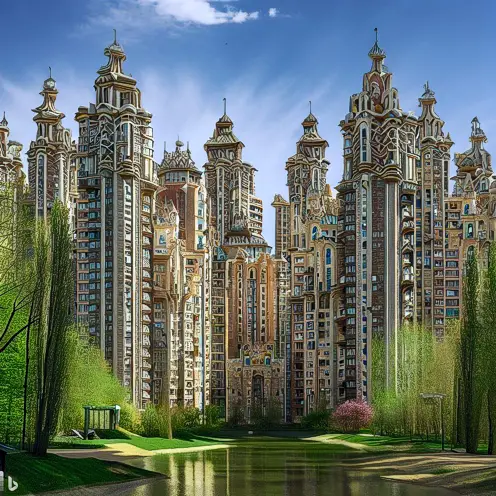
Likewise, the office buildings would be in clusters surrounded by
gardens, parks, bicycle paths and recreational areas. This would allow
the office workers to have easy access to nature.
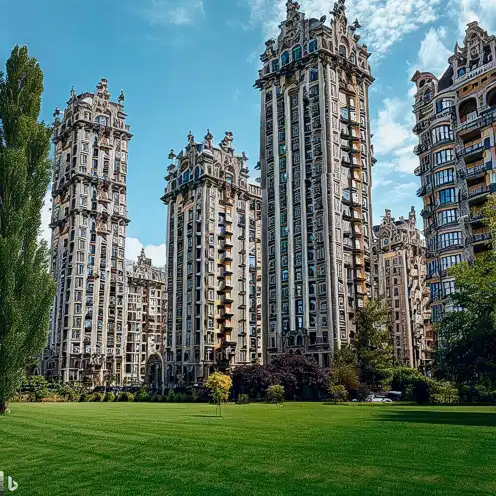
The factories that don't need extremely heavy equipment or supplies
could also be placed in the tall buildings, thereby providing
the factory workers with access to nature.
The buildings that are for industrial purposes rather than people, such
as food storage, computer rooms, chemical processing equipment,
automated factories, and warehouses can be designed as decorations for
the city, and as
tall as possible to reduce the amount of land that they need.
The amazing creativity of the AI software might give
you some ideas of how our
factories could be decorations for the
city:
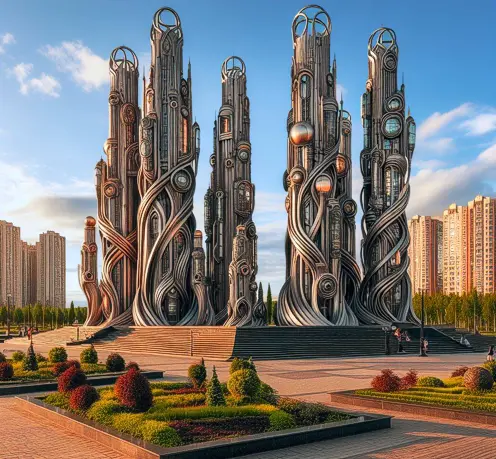
The schools, doctors offices, research laboratories, and daycare
centers would also be
in the clusters of tall buildings.
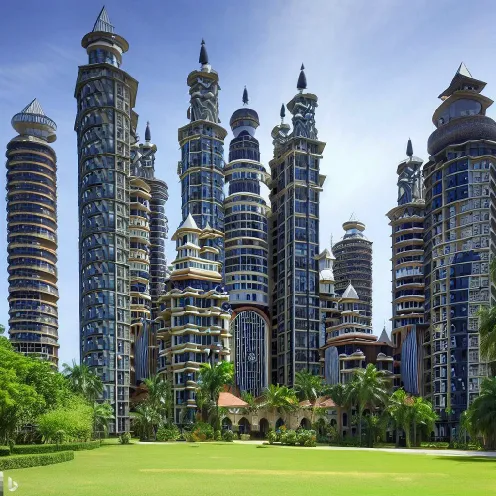
By having lots of land around the neighborhoods, there will be enough
land to scatter different types of gazebos in the parks, on the ponds,
and in the trees. Some of them
could be designed for children, and others would
be for adults. They would allow us to get together to relax, have a
party, or socialize, while being surrounded by nature and protected
from the weather and
insects.

By keeping crime to extremely low levels, children could get together
with their friends to sleep in the gazebos, like a slumber
party.
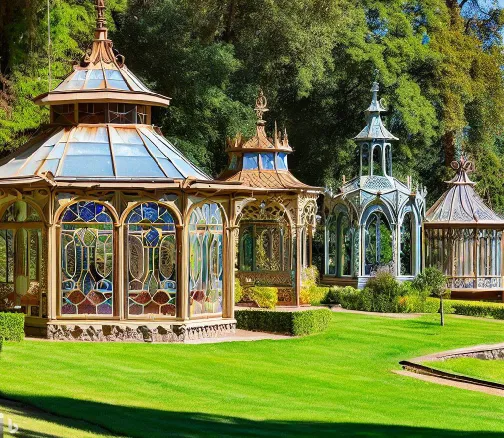
In the cities with cold climates, some gazebos could become greenhouses
that are kept warm be kept warm with
waste heat so that they provide us with year-round access to
tropical plants, such as orchids and bromeliads. Some of them
could be designed to be lounge rooms, others for dining, and others for
music or games.
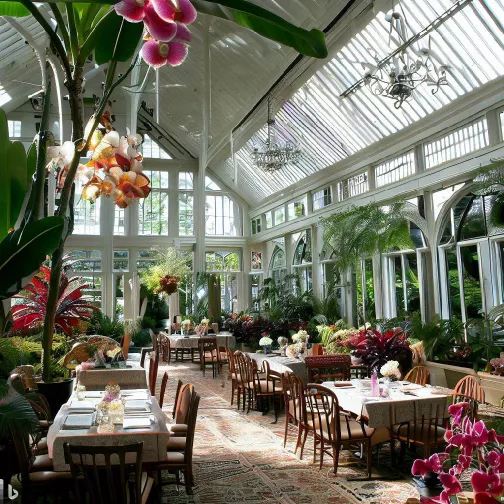
If some gazebos attract more people than they can handle, the
popular gazebos would be available by reservation only. As described here,
since the city
does not have a wealthy or peasant class, everybody has equal
access to the scarce items.
In the case of a popular gazebo, after a person has had his chance to
use it, he has to wait for other people to have their chance before he
can
use it again. Computers would keep track of the reservations so that
people don't
have to bother with such a boring chore.
The same concept applies to all of the other resources that have a
higher demand than there is a supply for them, such as music concerts,
museums, and scarce foods. Specifically, computers would provide
everybody with equal access to the scarce resources by ensuring that
everybody who wants to use a particular resource has the chance to use
it before somebody uses it again.
Since computers can now
recognize our faces, understand our speech, and talk to us, we can make
reservations for the scarce resources by calling the city's computer
and asking when it will be available to us. The computer would let
us know if it's available, and if not, we could request the computer to
notify us when our
opportunity to use it arises again.
Light panels
and computers can replace windows
An alternative to windows
would be sheets of frosted or stained glass that have lights behind
them.
An even better option would be some type of computer screen because
that can simulate anything, and it can also be used as a computer
monitor and telephone. It could also switch images automatically to
prevent us from getting bored with the same image.
There are some companies, such as liquidview, selling flat
panels as a replacement
for windows, but they are extremely
expensive as of 2024. However, they will certainly become more
reliable, durable, energy efficient, and less expensive in the future,
so they will eventually become sensible replacements for windows.
Unlike a free enterprise system, in which there is a lot of emphasis on
short-term profit, the Neighborhoods Ministry can justify projects that
have a high cost if they provide cost savings in the future,
or if they provide enough value to human life to be considered worth
the expense.
This requires the Neighborhoods Ministry to make decisions about when
they are
making something too
beautiful or too advanced. For example, would we be wasting our
resources by replacing some of our windows with stained-glass light
panels or
computer monitors?
In a free enterprise system, each person decides for himself what is
worth purchasing, and when he is spending " too much" money on something. For
example, some people consider wine, jewelry, expensive automobiles,
lottery tickets, Hollywood movies, candy bars, and pet animals to be
justifiable expenses, whereas other people consider those things to be
a waste of money.
Since this economic system puts the ministers in control of every
aspect of it, the Neighborhood Ministry must make decisions about when
they are putting "too much" resources into a project.
Light panels and computers can replace
alarm
clocks
Although light panels and
computer monitors are still quite expensive, they will become
increasingly practical, and eventually become desirable because they
will be able to do things that windows cannot do.
For example, in the image below, imagine the stained glass window has a
light panel behind it. Instead of waking up to a
loud buzzing noise from an alarm clock, we could set an alarm on the
light
panel so that it turns on at a very low
brightness level, and then it would slowly
increase the brightness over 10 to 15 minute, thereby waking us up
gently, as if the sun was
rising.
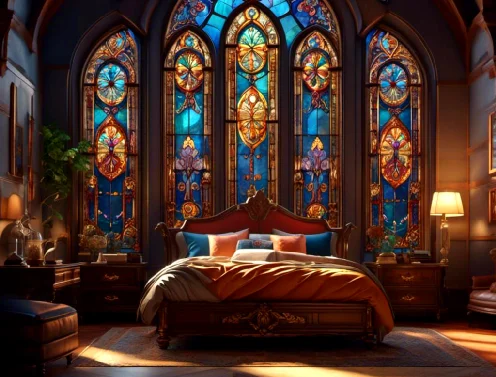
A computer monitor would be
even more useful than a light panel because a computer panel can
simulate different types of stained glass
windows, and display photographs, drawings, videos, and animations. A
computer can also create different types of white noise that decrease
in volume as we go to sleep.
Those type of windows would not need curtains. Instead of closing the
curtains, we would turn off the light panel or the computer monitor.
By providing the computer
with a microphone and speech recognition software, we would tell the computer what we want it to
do rather than be bothered with keyboards, switches, knobs, or
touchscreens.
For example, we could tell the computer to slowly wake us up in the
morning,
but instead of waking us up with an irritating noise, we could request
the
computer to turn on the panels to its dimest level at 6
AM, display a random stained-glass window, and slowly
increase to full brightness during the next 15 minutes, as in the image
below:
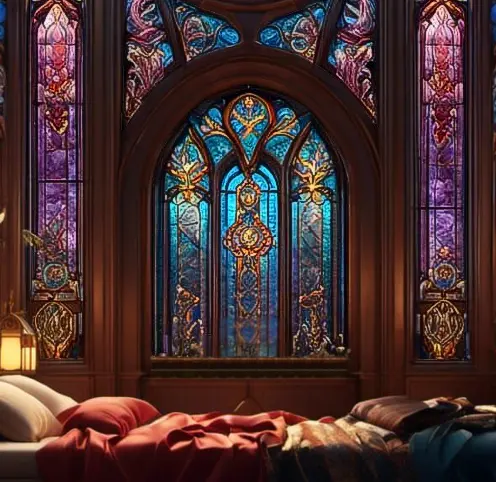
Or we could also request the computer to display stained-glass windows
on only some of the panels, and display a slideshow of beautiful mushrooms
in the primary panel, as
in the image below:

Or we could request a
simulated sunrise, a video of birds
chirping,
or a slideshow of photos of our family or of unusual flowers.
The lounge rooms, restaurants, music rooms, office rooms, day care
centers, and other rooms that don't have good views of nature could be
provided with light panels behind stained-glass windows, such as the
lounge room in the image below:
Computers might help
children sleep
Computer panels
might also help children get to sleep at night by displaying images or
videos while telling them a story, and slowly dimming the lights
and reducing the level of its artificial voice.
However, instead of telling stories that are
frightening, such as Hansel and
Gretel, or stories that encourage pouting, envy, or unrealistic
expectations, such as The Ugly
Duckling, I suggest the
stories be pleasant and relaxing.
The children could also
request the computer to play music or songs, while slowly decreasing
the level of the audio and lights. Some children might even want the
computer to imitate the voice of their mother or father.
|
